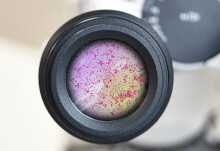

Drinking sugar-sweetened beverages is associated with higher blood pressure, according to a study of over 2,500 people reported in the journal Hypertension.
See also:
Related news stories:
Imperial College London News Release
Under embargo until
9pm GMT
Monday 28 February 2011
Drinking sugar-sweetened beverages is associated with higher blood pressure, according to a study of over 2,500 people reported this week in the journal Hypertension.
High blood pressure is a major risk factor for heart disease, which is the leading cause of death worldwide. Someone with a blood pressure level in millimetres of mercury (mmHg) of 135 over 85 is twice as likely to have a heart attack or stroke as someone with a reading of 115 over 75.
The new research shows that for every extra can of sugary drink consumed per day, participants on average had a higher systolic blood pressure by 1.6 mmHg and a higher diastolic blood pressure by 0.8 mmHg. This difference was statistically significant even after adjusting for factors such as weight and height.
The study did not examine the mechanism that might link sugary drinks with blood pressure. However, the researchers suggest that raised uric acid, which has been linked to sugar-sweetened beverage consumption, might raise blood pressure by reducing the levels of nitric oxide, a chemical that relaxes the lining of the blood vessels.
The association between sugary drinks and higher blood pressure was especially strong in people who consumed a lot of salt as well as sugar. Diet drinks were linked with lower blood pressure levels in some analyses, but the association was not consistent or strong.

Professor Paul Elliott
Professor Paul Elliott, senior author of the study, from the School of Public Health at Imperial College London, said: "It's widely known that if you have too much salt in your diet, you're more likely to develop high blood pressure. The results of this study suggest that people should be careful about how much sugar they consume as well."
The researchers analysed data from 2,696 volunteers aged between 40 and 59, in eight areas of the US and two areas of the UK. On four separate occasions over a period of three weeks on average, the participants reported what they had eaten in the preceding 24 hours, as well as giving urine samples and having their blood pressure measured. The volunteers were taking part in INTERMAP, the International Study of Macronutrients, Micronutrients and Blood Pressure.
The researchers also found that people who drink more sugary drinks tended to have more unhealthy diets in general. As well as consuming more sugar, those consuming more than one sugar-sweetened beverage a day consumed more calories by 397 kilocalories per day on average, and less fibre and minerals. Those who did not consume sugar- sweetened beverages had a lower body mass index (BMI) on average than those who consumed more than one drink per day.
"Individuals who drink a lot of sugar-sweetened beverages appear to have less healthy diets," said Dr Ian Brown, the study's first author, also from the School of Public Health at Imperial College London. "They are consuming empty calories without the nutritional benefits of real food. They consume less potassium, magnesium and calcium."
"This is a population study," Dr Brown added. "It can't say definitively that sugary drinks raise your blood pressure, but it's one piece of the evidence in a jigsaw puzzle that needs to be completed. In the meantime, we would advise people who want to drink sugar-sweetened beverages should do so only in moderation."
The work was funded by Dr Brown's PhD studentship grant from the Medical Research Council. INTERMAP received funding from the National Heart, Lung and Blood Institute (US), the National Institutes of Health (US), West Midlands National Health Service Research and Development, the Northern Ireland Chest, Heart and Stroke Association, and national agencies in China and Japan.
For further information please contact:
Sam Wong
Research Media Officer
Imperial College London
Email: sam.wong@imperial.ac.uk
Tel: +44(0)20 7594 2198
Out of hours duty press officer: +44(0)7803 886 248
Notes to editors:
1. Journal reference: I.J. Brown et al. "Sugar-sweetened beverage, sugar intake of individuals, and their blood pressure: International Study of Macro/Micronutrients and Blood Pressure" Hypertension, published online 28 February 2011.
2. About Imperial College London
Consistently rated amongst the world's best universities, Imperial College London is a science-based institution with a reputation for excellence in teaching and research that attracts 14,000 students and 6,000 staff of the highest international quality. Innovative research at the College explores the interface between science, medicine, engineering and business, delivering practical solutions that improve quality of life and the environment - underpinned by a dynamic enterprise culture.
Since its foundation in 1907, Imperial's contributions to society have included the discovery of penicillin, the development of holography and the foundations of fibre optics. This commitment to the application of research for the benefit of all continues today, with current focuses including interdisciplinary collaborations to improve global health, tackle climate change, develop sustainable sources of energy and address security challenges.
In 2007, Imperial College London and Imperial College Healthcare NHS Trust formed the UK's first Academic Health Science Centre. This unique partnership aims to improve the quality of life of patients and populations by taking new discoveries and translating them into new therapies as quickly as possible.
Website: www.imperial.ac.uk
3. About the Medical Research Council
For almost 100 years the Medical Research Council has improved the health of people in the UK and around the world by s upportin g the highest quality science. The MRC invests in world-class scientists. It has produced 29 Nobel Prize winners and sustains a flourishing environment for internationally recognised research. The MRC focuses on making an impact and provides the financial muscle and scientific expertise behind medical breakthroughs, including the first antibiotic penicillin, the structure of DNA and the lethal link between smoking and cancer. Today MRC funded scientists tackle research in to the major health challenges of the 21st century.
www.mrc.ac.uk/
Article text (excluding photos or graphics) available under an Attribution-NonCommercial-ShareAlike Creative Commons license.
Photos and graphics subject to third party copyright used with permission or © Imperial College London.





